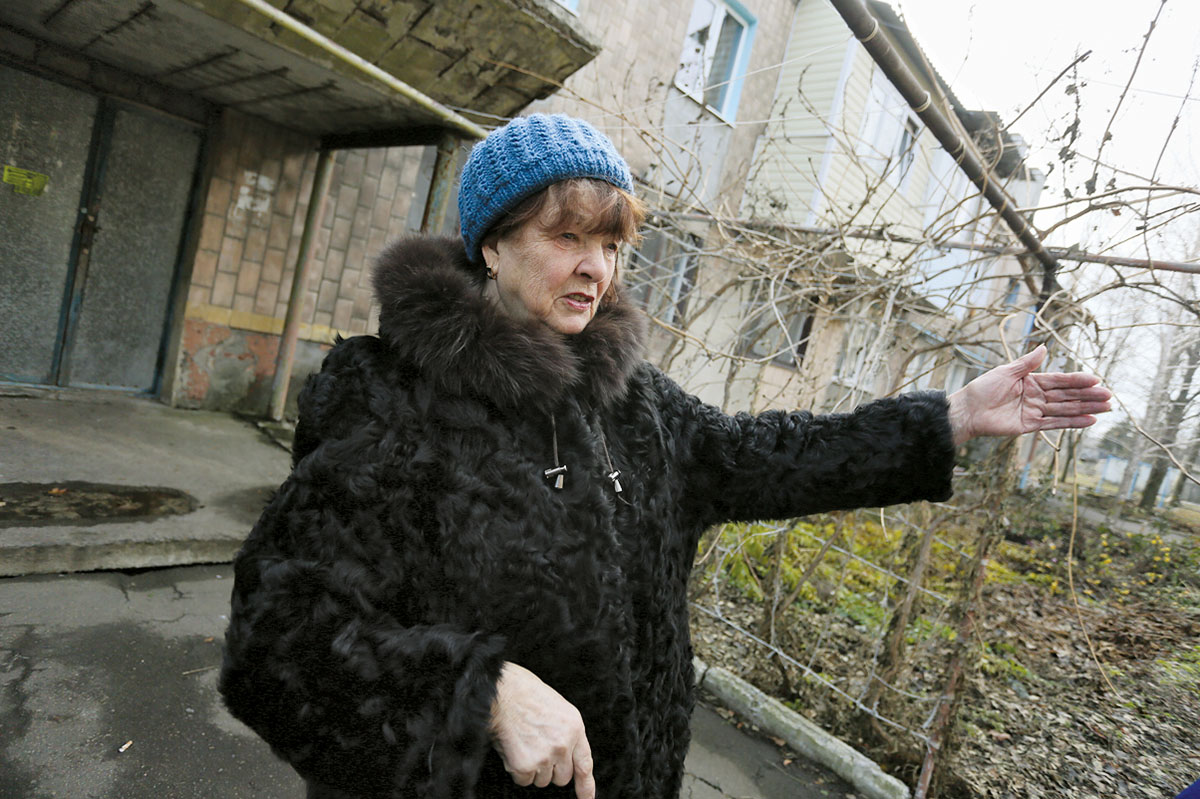NOVOLUHANSKE, Ukraine — In late November, Ukraine’s troops took control over the villages of Travneve and Hladosove in Donetsk Oblast, all without firing a shot.
Both villages, located in 680 kilometers southeast of Kyiv and on the outskirts of the Russian-occupied city of Horlivka, held no interest to enemy forces and remained a no man’s land.
But the encroachment, nonetheless, provoked the start of shelling which continues to this day. Four soldiers were killed in fights in this area only on Dec. 8.
At least eight civilians, including one child, were wounded after the Russian-proxy troops fired Grad multiple rocket launchers at the town of Novoluhanske, located by Travneve and Hladosove, on Dec. 18, according to a Donetsk Oblast police report.
The shells damaged more than 40 houses and a local school and kindergarten, located dangerously close to a dormitory where the soldiers live.
Two people were wounded by shells on the same day in Russian-occupied Horlivka, the observers of the Organization for Security and Cooperation in Europe reported.
The fights also prompted many civilians to flee their homes. The OSCE reported on Dec. 15 that residents escaped from Travneve and Hladosove to safer Novoluhanske because of constant shelling.
Tetiana Ptashnychenko, 52, had her family separated.
Because of the fighting, she couldn’t return from Novoluhanske, where she traveled every day with her grandson to allow him to get to school, to her home in Dolomitne.
The village of Dolomitne, located between government-controlled Novoluhanske and Travneve, wasn’t liberated because the Russian-backed troops keep their checkpoint there at a local train station.
Ptashnychenko’s husband and son can’t leave the village because of their work at a local sheep farm.
“Ukraine is here. The (separatists are) there. And we are like hostages between them,” Ptashnychenko said.
Ptashnychenko became a dishwasher at a school in Novoluhanske to make sure her 9-year-old grandson Sasha Sayenko stays safe. Sasha’s mother lives in Russian-controlled Holmivsky with her new family while Sasha grows up with his grandparents.
During a school break in Sasha’s third grade, the boys run along the school corridors while the girls share their tips on how listening to music through earphones helps them to sleep amid shelling.
The classroom is decorated with the children’s collages made from winter leaves and big posters about mine warning.
Ptashnychenko said her grandson likes his Ukrainian school in Novoluhanske and has many friends there. But she isn’t sure he would be able to study there next year because of the difficulties and dangers of traveling through the separation line.
Ptashnychenko plans to make a trip together with her grandson to Dolomitne for the Christmas holidays to meet their family. She says because of the constant shelling her husband and son now have to predominantly live in a basement, where they have three beds, a heater, and a TV set.
“My son and husband now go out just to feed their livestock and then run back,” she said.
Although Dolomitne is just one kilometer from Novoluhanske, Ptashnychenko’s way home goes through the border crossing checkpoint in Mayorsk, a travel which takes up to one day.
The same trip is required by hundreds of residents who live in Russian-controlled Horlivka and Holmivsky but work on the pig farm in Novoluhanske. Some of them had to recently leave their homes and resettle to Novoluhanske to keep their jobs. The bus, which used to regularly bring the workers to the pig farm passing across the frontline, is no longer allowed through the local checkpoint.
The checkpoints separate Novoluhanske even from the town’s cemetery. The soldiers allow only two people to go there for a funeral and open the cemetery for visitors once per year in spring when the locals commemorate their late relatives.

Lidiya Kovalivska, a Dolomitne city council member, stands by her new home in Novoluhanske in Donetsk Oblast, where she had to move after the fighting in Russia’s war escalated in late November. (Oleg Petrasiuk)
Dolomitne, whose population numbers only 20 residents, is officially considered to be a part of the government-controlled area. But in fact, it’s under Russian-proxy forces, so its 15 pensioners aren’t able to collect their pensions, the main means of survival for most of them.
Lidiya Kovalivska, who is a local deputy from Dolomitne, used to regularly travel there from Novoluhanske to deliver the residents their pensions. But recently the soldiers banned her travel to Dolomitne and now she worries how the locals could survive there.
They don’t receive any pension from the Russian proxy authorities and may rely only on the help of the international humanitarian organizations, she said.
Kovalivska, 71, who worked as a station attendant in Dolomitne before retirement, said her house was recently burned down there after a shell dropped on it. Her husband, who was at home at that moment, was lucky to go out outside to feed a dog, which saved his life.
Now they live together in Novoluhanske thanking their neighbors who donated them a refrigerator and TV.
“I see no end to all these sorrows,” Kovalivska said with a sigh.
